Jeff's Camping Journal
A Wildlife Sanctuary in the Land of Cold
Primitive Camping Along the Jefferson River
Thursday November 30th - Monday December 4th, 2000
This past weekend, I ventured on my second ever winter primitive camping trip. My friend Tom Elpel and I journeyed down near Harrison, Montana on the Jefferson River to an area rich with wildlife and abundant with natural resources--even at this time of year. Tom has been practicing primitive outdoor skills since he was a kid. Many of his skills revolve around wilderness survival in adverse conditions and trying to stay comfortable with little gear on one's back. More importantly, they revolve around one's participation and awareness in nature. In the sense of awareness, these trips are very spiritual for me--the wilderness, plants and wildlife are my cathedral, my church and my scripture.
Primitive trips are always very challenging because one brings very little gear along. Imagine camping without a tent, sleeping bag, matches or lighter, and without much food. That would be difficult in itself. Now, try this in winter! The challenge with winter primitive camping is that one spends a lot of their time trying to stay warm and find/prepare food. To make matters more interesting, there are only about 7-8 hours of daylight to work by and impossibly long nights. I knew from my first trip of this type back in February that this would be a hard trip.
The area we were to camp in is located in some fairly remote hills bordering the Jefferson River between Butte and Bozeman. Lewis and Clark went up this stretch of river in 1805 on their historic journey across America.
Expecting temperatures between about 10 and 35 degrees, we each armed ourselves with some warm clothes, one wool blanket, some primitive fire making tools and a few utensils. We had little food, no sleeping bags, no tent, no fancy equipment and about four days and night to enjoy (or suffer through!).
My wife Becky dropped us off along the side of the highway in the dark. We were in the middle of nowhere with gentle hills on all sides, no houses anywhere and lots of empty, snow covered fields. We walked a couple of miles on the train tracks until we came upon the Jefferson River and into a swampy area. It was pitch black with no moon and we constantly heard wildlife scurrying as we approached their hiding spots. Several deer bounded across a field and many ducks took off from a spring-fed pond on our right. We eventually veered off the tracks and into a seemingly forgotten niche of ponds, cottonwoods and willow thickets, plus a little canyon full of juniper trees, sage and rock.
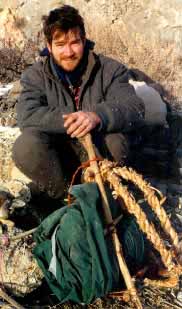 The two of us walked up into a little canyon in the dark looking for a campsite. We decided upon several spots. The spot we finally choose was near a cliff face and under a mountain mahogany tree (Cercocarpus ledifolius) which provided some minimal shelter from any precipitation. I started a fire with a bowdrill set (by wood friction) on some bare ground and then we stoked it until it grew to sufficient size. We each stretched out in our blankets on a bed of surprisingly comfortable rocks and tried to sleep with the fire warming us. The temperature was less than twenty degrees and was fine when we were walking, but started feeling cold as we lay still to sleep. I was wearing five layers of clothing on the top half of my body including thermal underwear and three layers on my legs including some Chinese Army wool pants leftover from the Cold War. I had two hats on my head.
The two of us walked up into a little canyon in the dark looking for a campsite. We decided upon several spots. The spot we finally choose was near a cliff face and under a mountain mahogany tree (Cercocarpus ledifolius) which provided some minimal shelter from any precipitation. I started a fire with a bowdrill set (by wood friction) on some bare ground and then we stoked it until it grew to sufficient size. We each stretched out in our blankets on a bed of surprisingly comfortable rocks and tried to sleep with the fire warming us. The temperature was less than twenty degrees and was fine when we were walking, but started feeling cold as we lay still to sleep. I was wearing five layers of clothing on the top half of my body including thermal underwear and three layers on my legs including some Chinese Army wool pants leftover from the Cold War. I had two hats on my head.
As I fidgeted in and out of sleep that first night, trying to stay warm and feel my frozen feet, I wondered what the hell brought me out on these trips. Why did I take my weekend and a vacation day to suffer this discomfort? For one, I felt that I needed to get back some inner purity and quiet into my life. I was weary from office politics, Florida's 'Electile Dysfunction' and other things busying up my mind. Another reason perhaps could be found in my memories from nine months ago on my first winter camping trip of this sort. (see Missouri Moonlight.) I remembered that first trip, when four of us including Tom (who was now asleep on his rocks, lucky guy) walked from Canyon Ferry Lake about 40 miles south to Toston. On that trip, I had been ready to walk out after a day or two and hitchhike home. I had felt that I couldn't take the cold and hunger that these trips impose on a person.
Before quitting that trip and walking out, however, I had broken down and cried my eyes out. After crying, I had felt instantly better and greatly enjoyed myself the rest of the trip. I had broken through my comfort barrier and realized that the cold and hunger I felt were mostly psychological as opposed to physical. It is true that one is out in the cold and does not eat much food on these winter trips, but one also finds that discomfort is a very relative thing, often conditioned by expectations. If we make $50 K a year, we want more. If we have two cars, we want three--even though most don't need these things. Breaking through that comfort zone of mine back on that first trip and letting myself be a bit hungry and cold was one of the most powerful experiences of my life and made me stronger back in my daily life. It was also powerful to gain such a strong connection to nature that comes when one is living off the land. That trip nine months ago changed my life and really encouraged me to start looking at everything as holistically as possible. It also increased my love of the outdoors. I wanted such an experience again on this trip. That was why I was shivering on this pile of rocks in Nowhere, Montana.
As I shivered next to the fire, I really wondered if the same powerful experience would happen this time and if it would take two days to 'break through that comfort barrier' like it had the first time. A few hours later with a couple hours of fitful sleep, I finally got up and walked around. Tom joined me and agreed that we needed to eventually find warmer shelter than an exposed pile of rocks and small fire! We walked around some more until the morning light finally came up. At this point in December, there are about 13 hours of pitch black in Montana and 7 hours of true daylight. Even then, the daylight is pale, the sun very low on the horizon, and the air still chilly during the day.
As the sun rose, we ate a breakfast of gruel (oatmeal-type stuff) that I had brought and moved our gear about a mile down the canyon away from the train tracks and river. Being a bit hungry, any food we ate tasted good. Gruel was gourmet. After moving our gear, we went back down the canyon towards the river to practice some primitive hunting. We fashioned spears out of willow branches using our pocket knifes. We found ourselves in some cottonwood trees in a fairly rich area for wildlife and plants. Tom has been to this area several times before, so he knew what was here and showed me some previous shelters he had stayed in. One shelter he had stayed in was a ground cavity under a huge fallen tree with some tree bark to cover the back end and some brush to hide the shelter opening.
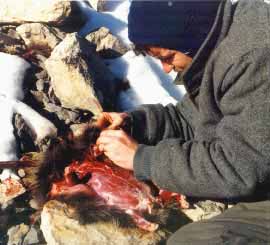 In the cottonwood trees, we walked towards the river and identified the tracks of coyote, bobcat, pheasant, various birds, raccoons, deer (of course), and finally porcupine. We had decided to hunt porcupine and find ourselves a meal. Tom tracked some prints into a thicket which produced nothing. He then tracked the prints into a smaller thicket of bushes and sure enough, there he was trying to hide. Tom pinned the porcupine with his willow spear. By this time, the creature had his quills straight up, so we kept our distance. As Tom told me to jab my spear into its side, I felt sick because I have never hunted before. Still, I went around to the side of the little guy and stuck my stick into the critter's side. He shrieked as I and Tom kept sticking our spears through him. Tom finally pulled him out into the snow from under the thicket and finished him off with two thrusts to the heart. Each time, the Porcupine would curl up his little furry body to try and avert the blows which made me feel bad for doing this. I thought of our cats at home! On the other hand, we said thank you to the animal for giving up his life and planned to use him for a meal. To me, that is hunting with respect.
In the cottonwood trees, we walked towards the river and identified the tracks of coyote, bobcat, pheasant, various birds, raccoons, deer (of course), and finally porcupine. We had decided to hunt porcupine and find ourselves a meal. Tom tracked some prints into a thicket which produced nothing. He then tracked the prints into a smaller thicket of bushes and sure enough, there he was trying to hide. Tom pinned the porcupine with his willow spear. By this time, the creature had his quills straight up, so we kept our distance. As Tom told me to jab my spear into its side, I felt sick because I have never hunted before. Still, I went around to the side of the little guy and stuck my stick into the critter's side. He shrieked as I and Tom kept sticking our spears through him. Tom finally pulled him out into the snow from under the thicket and finished him off with two thrusts to the heart. Each time, the Porcupine would curl up his little furry body to try and avert the blows which made me feel bad for doing this. I thought of our cats at home! On the other hand, we said thank you to the animal for giving up his life and planned to use him for a meal. To me, that is hunting with respect.
That afternoon, Tom and I found some bare rock by our first shelter and sat warmly in the sun, knowing that we should cherish the few short hours of day. I started making some natural cordage (twine) out of dried stinging nettles and then helped Tom skin Mr. Porcupine. Skinning him involved dealing with skin, blood, guts and Porcupine shit as we cleaned him out. The awful smell from its punctured gut was something I will never forget. We decided that our dinner needed some further cleaning before going over the fire.
So, we walked back down the canyon to one of the spring-fed ponds by the train tracks and washed our kill, and collected some veggies and roots for our dinner meal. This included cattail roots and some green Watercress that was still growing in the winter cold pond water! In fact, there was an amazing amount of life living in this area during a cold Montana winter. We saw snails in the water, looked for fish, saw watercress growing, and watched a sandpiper in the pond edge. There were birds and ducks everywhere. Part of the reason for this is that the surrounding ponds are fed by warm springs that stay ice-free year long. Suddenly, a train rolled right by us probably without seeing us as we were below the level of the tracks down in the cattails. We brought our 'loot' back to camp to cook.
We took the coals from the still smoldering fire at our first camping site and started cooking dinner. Our dinner consisted of all natural things we collected, including roasted Porcupine stuffed with Watercress and roasted cattails roots. We boiled the legs and arms of the Porcupine in a stew with cattail shoots and watercress. After cooking, the cattail roots were eaten by peeling off the blackened skins and taking the stringing insides into one's mouth and pulling the starch off. The porcupine tasted like pork with a gamy aftertaste. It was a good dinner! What interesting new tastes! One appreciates what they eat after having to collect it, prepare it and cook it. Our food today in supermarkets is so convenient, plump, big and artificially flavored that we just shove it down our gullets often without thinking. I know I do. In nature, everything is smaller with more bones, work, etc. and one really gets into the process of eating and savoring.
We walked to the second campsite further up the canyon and I started a flint and steel fire with some help from Tom. I took a steel file and forcefully hit it on the sharp end of a quartzite rock creating sparks. A piece of charcloth was set on the rock with my thumb in order to catch a spark and light. Once a steel spark caught the charcloth on fire into a slow burn, I took the smoldering charcloth and stuffed it into a bird's nest made of cottonwood bark. I blew the charcloth coal in the bird's nest and it began to catch the nest on fire as I blew. The key was to get the nest to ignite into flames. Once the nest ignited, the next step was to put small kindling twigs on the flaming nest bundle to catch them on fire and then increase the size of kindling like any other campfire. Twice, my bundle ignited into flames, only to die again and finally go out. I grudgingly tried a third time with a dried grass bundle and got it.
This evening, we were going to try to make coal beds to sleep on. The idea of a coal bed is to dig a trench several inches deep into the ground and about 6 feet long or as long as one's body. Then, a fire is built the entire length of the trench and is kept burning strongly for two or more hours. Finally, one fills the trenches back in with dirt to put out the fire, and the surrounding ground has now been heated up after several hours of fire. A poncho or some type of air seal is put down over the filled trench, and the person lies wrapped in a blanket on the poncho and a second air seal goes over the person--usually the other half of the poncho. In this way, heat radiates up to the person from the ground for the whole night, hopefully. The trick is to keep a six foot long trench fire going for two hours so as to generate enough heat. However, one must make sure the ground is not too hot or else they might set themselves, their blanket and their poncho on fire. I almost gave up keeping my damn fire going at one point and Tom helped me out. He is good at sensing other's frustrations!
Building the coal bed, I was getting increasingly frustrated with this trip. I knew that I had to break through my comfort zone to enjoy the trip and knew it would take some time, but I was really tired. Twenty-four hours into the trip and I had not broken through yet. I was lacking sleep from the night before, pretty hungry, getting cold, dirty and wanted to be back on my normal daily schedule. I was also dreading sleeping during the long, cold night and waking up cold. Why was I so dissatisfied with this camping trip when this is what I had intentionally asked for?
We finally got our coal beds ready and bedded down. Immediately, my top was too hot and my feet were freezing. Here goes another sleepless night, I thought. About five hours later, we both woke up cold because our beds had lost most of their heat. So, we took a hike simply to warm up. We figured it was about 3 a.m. when we started hiking. During this trip, we used the constellation Orion as kind of a clock. Orion was about halfway down the horizon to the West so we figured it was about 3 a.m. We hiked up to some surrounding hills and warmed up. On top of a high hill, we saw the lights of Three Forks off in the distance and several meteors.
Back down in the canyon after our hike, we waited until morning. We took it easy Saturday morning, and cooked some ashcakes right on the fire. The cakes were made out of water, white flour, crushed pigweed seeds (Amaranthus spp.), crushed bitterroots (Lewisia rediviva) and reed-canary grass seed (Phalaris canariensis). To drink water, we took our cups and scooped up snow. The snow-filled cup was then put near the fire and heated up until the water was warm or boiling. As this took a while to do, even getting a drink of water was a chore. Dammit all! AHHHHHHHHHHHHHHH! I want to go home.
The ashcakes were quite delicious along with the trail mix I had brought along and I felt a bit better. I think we also had some rice and lentils for breakfast boiled in our cups. I would have eaten anything at that point--roadkill, tree bark, whatever! Not only did we eat little, but we were exerting a lot of calories staying warm and hiking. I kind of rested in the morning and Tom went off to hunt. Going to the bathroom was hysterical, especially with snowball and dried grass toilet paper. I ended up getting snow and grass stuck up my ass. That afternoon, while Tom was tending fire, I took a hike. The sun had gone behind a cloud as had my mood again, because our precious few hours of warm daylight were being taken from us.
I started practicing my speech to Tom about how I wanted to end the trip that afternoon (a couple of days early) because my body temperature seemed to be so hard to maintain out there. An alternative speech to Tom was to tell him that maybe we could at least build a better shelter the remaining two nights so that we wouldn't have to freeze. I just did not want to face another long night being cold! With that said, I vowed to talk with Tom about my wishes and then began to release my annoyance with constantly being uncomfortable.
I took an afternoon hike up to some surrounding lonely hills and I noticed a brightening in my mood. After another potty experience, I eventually made it back to camp. I amazingly ended up pottying at the same tree I had earlier as evidenced by some previous disgust piled near the trunk. Tom and I agreed to set off that night for a new site about six miles away to a place where he had built a wickiup shelter that might be warmer (I hoped).
First, however, he wanted to show me something in the area before leaving and we walked down to the river. We followed the train tracks and passed between two sheer cliffs attached to two mountains that rose abruptly out of the landscape. Along the way, we identified all sorts of animal tracks. The train tracks were like a super highway for coyote, bobcats, raccoons, birds, pheasants, rabbits, deer, etc. It was an animal tracker's dream. We finally came to a place where warm water spilled out a pipe from the side of a mountain. We toweled off with the water and I was feeling better. Tom saw some animal scat (poop) and asked me to identify it. After a few guesses, I arrived at the right answer--a bird that had eaten a lot of juniper berries.
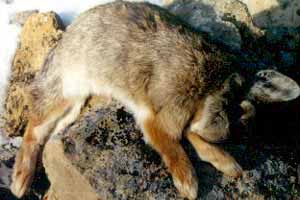 Before we headed back toward our new site several miles away, I spotted a rabbit on a pile of rocks. Tom chased it, following its tracks into a big bush. He asked me to get some rocks to kill it with, and by the time I did, he had a dead rabbit in his hands. He had cornered the rabbit in the bush, hit it in the side with a rock and then grabbed the stunned rabbit by the hind legs and smashed its head on a rock. We thanked the rabbit and took it along for a future meal. Some of you reading this may feel that our killing of small game was cruel, but remember that we used these animals for food, gave them the utmost respect and thanked them for giving their lives. Whenever you eat meat or veggies or breads, some living thing has died to fill your gullet. Plants and dinosaurs died a long time ago to put gas in your car. It is a part of life. That is why we should each give thanks before a meal to the things that died to provide it. And, we should use what we kill and not waste it.
Before we headed back toward our new site several miles away, I spotted a rabbit on a pile of rocks. Tom chased it, following its tracks into a big bush. He asked me to get some rocks to kill it with, and by the time I did, he had a dead rabbit in his hands. He had cornered the rabbit in the bush, hit it in the side with a rock and then grabbed the stunned rabbit by the hind legs and smashed its head on a rock. We thanked the rabbit and took it along for a future meal. Some of you reading this may feel that our killing of small game was cruel, but remember that we used these animals for food, gave them the utmost respect and thanked them for giving their lives. Whenever you eat meat or veggies or breads, some living thing has died to fill your gullet. Plants and dinosaurs died a long time ago to put gas in your car. It is a part of life. That is why we should each give thanks before a meal to the things that died to provide it. And, we should use what we kill and not waste it.
By the time we got our gear around and set out for the new site, it was almost dark. "Only 13 hours till sunrise", I joked. We walked to the highway and rested under the bridge. Tom and I confided in each other that it was often hard to find male friends of our age (around 30 years old) that had the same interests as we did. We agreed that our friendship had really started to develop in something beyond just learning these outdoor skills. We could talk philosophy and discuss personal issues without feeling embarrassed. We each have wives and Tom has three kids (with number four due soon), but both of us really feel the need to hang out with men in a deeper way that just drinking beer, lighting farts and watching football (although I appreciate all three of those activities). I think fondly of the Men's Club I have joined in Helena, where several men hang out in a ritualistic and supportive environment doing activities from meditation to drumming to outdoor activities to singing, etc. (where one doesn't have to hear another male call you a "fag" or a "pussy" if you divulge something sensitive or show emotions--This is the male bonding I often had to endure).
By the time we left the bridge and continued to our new site, I knew I had FINALLY broken through my psychological comfort barrier. I really felt alive and was enjoying myself, now, without feeling cold or hungry. It took about forty-eight hours from our initial drop-off to reach that good state. Yup, about the same time it took on that first trip back in February--two days. This good feeling is why I chose to endure the discomfort. The feeling is one of always being in the moment with a very clear mind and almost no distraction or schedule.
We continued along the river about five more miles until we got to an abandoned house in a grassy field surrounded by hills. Along the way, we stuffed our clothes with dried wild rye grass for insulation (in order to endure the cold night) and walked the rest of the way to the shelter looking like over-stuffed scarecrows. I got very tired and barely made it into the shelter.
The wickiup shelter was hidden well in a thicket of willows and clematis vines right near the river. It was built with old boards from the abandoned house stacked up in a tripod, like a wooden teepee. We built a fire and slept fairly well in the wickiup until the early morning. Although I slept better, both of us still had cold feet during the night and we figured there were several leaks in the wickiup wall causing this. One of the discomforts with primtive camping is that one constantly is inhaling wood smoke. My throat was getting a bit sore in the wickiup after three days of inhaling. However, the heat and great aroma was worth it. Tom suggested that we not burn too much cottonwood, as that smoke is more irritating.
The next morning, we ate more ashcakes with some instant bean dip mix. It was great. We also polished off the trail mix. We spent the third day of this trip shoring up the shelter with old wood from an outhouse and plugging the air leaks with dried grass, bark , etc. We collected cottonwood root along the river to make bowdrill sets (to start fires). Tom cleaned and skinned the rabbit and we collected a lot of firewood for cooking dinner and to get through the last night out of the trip. As the light faded, we ate a dinner of rabbit and rice and lentils. The rabbit meat was delicious and tasted like top quality chicken with some other flavor I couldn't place. That small rabbit filled both of us with a surprising amount of meat! No wonder the World Health Organization said that raising rabbits could solve world hunger.
Although I am mostly vegetarian, I really like wild meat that was hunted by someone. It tastes better, is not pumped full of chemicals and is very humane in that the animal was free right up to its death. The food we were eating was so natural and nutritious the past few days, that my belly burned a bit from its high nutrition. That night, both Tom and I hiked back to the spot with dried grass and re-stuffed ourselves. We also collected straw to put down on the ground to insulate our bodies. We slept quite well that night, our forth night, waking up at about 4 or 5 a.m. to pack our stuff and start walking towards a different road where Tom's wife would pick us up later that morning. We followed a spur of the railroad track through some beautiful country, talking about some projects we were working on at home, plus joking about the elections. We finally arrived at our destination point, and we both slept in the sun until our ride came.
After this trip I felt that I could walk back into my daily life with a renewed sense of energy and hope and that I could better accomplish my goals from the persistence I gained. I discovered a lot about how I learn and what my main obstacles are to achieving what I want to achieve. I felt refreshed after the trip and anxious to jump back in to life as I sat down to a large meal at Tom's house. Tom and I then drove to Helena.
That night, I had to lead a Helena Outdoor Club meeting where Tom was the featured speaker. I had to change from 'bushman' mode to public speaker mode, and was very overwhelmed. It didn't matter. Over 50 people showed up to hear Tom's great talk and he referred to our trip several times, selling some of his books there. Through the last four days I had been used to quiet and focused attention on simple activities and now people at this meeting were asking me questions and moving/talking VERY quickly relative to our camping trip. At one point, someone asked if I had heard about Gore's latest appeal to the Florida Supreme Court for re-counts and Bush's reaction. I smiled back and said, "today, I don't really care".
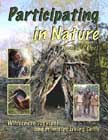
Go to Participating in Nature: Wilderness Survival and Primitive Living Skills
Return to the Primitive Living Skills Page




 Primitive Living Skills
Primitive Living Skills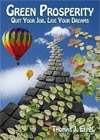
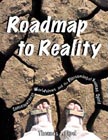
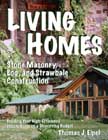

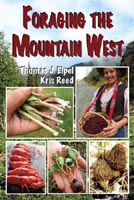
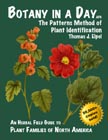

 The two of us walked up into a little canyon in the dark looking for a campsite. We decided upon several spots. The spot we finally choose was near a cliff face and under a mountain mahogany tree (Cercocarpus ledifolius) which provided some minimal shelter from any precipitation. I started a fire with a bowdrill set (by wood friction) on some bare ground and then we stoked it until it grew to sufficient size. We each stretched out in our blankets on a bed of surprisingly comfortable rocks and tried to sleep with the fire warming us. The temperature was less than twenty degrees and was fine when we were walking, but started feeling cold as we lay still to sleep. I was wearing five layers of clothing on the top half of my body including thermal underwear and three layers on my legs including some Chinese Army wool pants leftover from the Cold War. I had two hats on my head.
The two of us walked up into a little canyon in the dark looking for a campsite. We decided upon several spots. The spot we finally choose was near a cliff face and under a mountain mahogany tree (Cercocarpus ledifolius) which provided some minimal shelter from any precipitation. I started a fire with a bowdrill set (by wood friction) on some bare ground and then we stoked it until it grew to sufficient size. We each stretched out in our blankets on a bed of surprisingly comfortable rocks and tried to sleep with the fire warming us. The temperature was less than twenty degrees and was fine when we were walking, but started feeling cold as we lay still to sleep. I was wearing five layers of clothing on the top half of my body including thermal underwear and three layers on my legs including some Chinese Army wool pants leftover from the Cold War. I had two hats on my head.  In the cottonwood trees, we walked towards the river and identified the tracks of coyote, bobcat, pheasant, various birds, raccoons, deer (of course), and finally porcupine. We had decided to hunt porcupine and find ourselves a meal. Tom tracked some prints into a thicket which produced nothing. He then tracked the prints into a smaller thicket of bushes and sure enough, there he was trying to hide. Tom pinned the porcupine with his willow spear. By this time, the creature had his quills straight up, so we kept our distance. As Tom told me to jab my spear into its side, I felt sick because I have never hunted before. Still, I went around to the side of the little guy and stuck my stick into the critter's side. He shrieked as I and Tom kept sticking our spears through him. Tom finally pulled him out into the snow from under the thicket and finished him off with two thrusts to the heart. Each time, the Porcupine would curl up his little furry body to try and avert the blows which made me feel bad for doing this. I thought of our cats at home! On the other hand, we said thank you to the animal for giving up his life and planned to use him for a meal. To me, that is hunting with respect.
In the cottonwood trees, we walked towards the river and identified the tracks of coyote, bobcat, pheasant, various birds, raccoons, deer (of course), and finally porcupine. We had decided to hunt porcupine and find ourselves a meal. Tom tracked some prints into a thicket which produced nothing. He then tracked the prints into a smaller thicket of bushes and sure enough, there he was trying to hide. Tom pinned the porcupine with his willow spear. By this time, the creature had his quills straight up, so we kept our distance. As Tom told me to jab my spear into its side, I felt sick because I have never hunted before. Still, I went around to the side of the little guy and stuck my stick into the critter's side. He shrieked as I and Tom kept sticking our spears through him. Tom finally pulled him out into the snow from under the thicket and finished him off with two thrusts to the heart. Each time, the Porcupine would curl up his little furry body to try and avert the blows which made me feel bad for doing this. I thought of our cats at home! On the other hand, we said thank you to the animal for giving up his life and planned to use him for a meal. To me, that is hunting with respect.  Before we headed back toward our new site several miles away, I spotted a rabbit on a pile of rocks. Tom chased it, following its tracks into a big bush. He asked me to get some rocks to kill it with, and by the time I did, he had a dead rabbit in his hands. He had cornered the rabbit in the bush, hit it in the side with a rock and then grabbed the stunned rabbit by the hind legs and smashed its head on a rock. We thanked the rabbit and took it along for a future meal. Some of you reading this may feel that our killing of small game was cruel, but remember that we used these animals for food, gave them the utmost respect and thanked them for giving their lives. Whenever you eat meat or veggies or breads, some living thing has died to fill your gullet. Plants and dinosaurs died a long time ago to put gas in your car. It is a part of life. That is why we should each give thanks before a meal to the things that died to provide it. And, we should use what we kill and not waste it.
Before we headed back toward our new site several miles away, I spotted a rabbit on a pile of rocks. Tom chased it, following its tracks into a big bush. He asked me to get some rocks to kill it with, and by the time I did, he had a dead rabbit in his hands. He had cornered the rabbit in the bush, hit it in the side with a rock and then grabbed the stunned rabbit by the hind legs and smashed its head on a rock. We thanked the rabbit and took it along for a future meal. Some of you reading this may feel that our killing of small game was cruel, but remember that we used these animals for food, gave them the utmost respect and thanked them for giving their lives. Whenever you eat meat or veggies or breads, some living thing has died to fill your gullet. Plants and dinosaurs died a long time ago to put gas in your car. It is a part of life. That is why we should each give thanks before a meal to the things that died to provide it. And, we should use what we kill and not waste it.